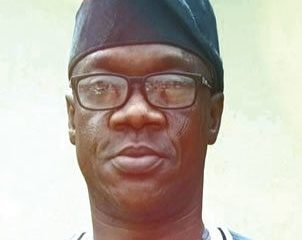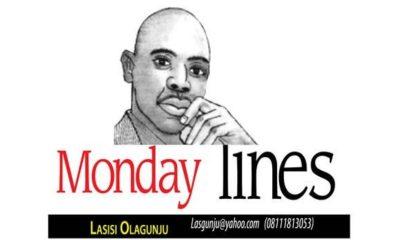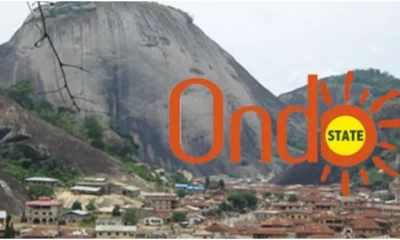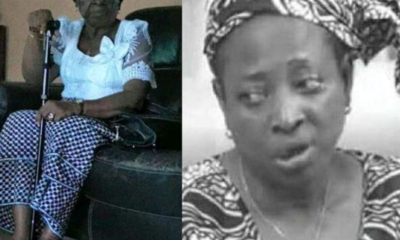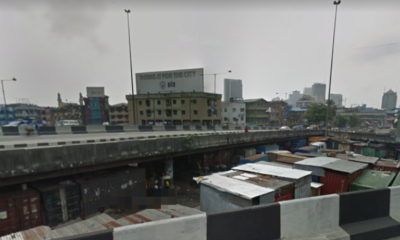Opinion
OPINION: Adamu’s Lamentation Equals Buhari’s Failure
Published
2 years agoon
By
Editor
By Suyi Ayodele
Lord Henry Peter Brougham lived between September 19, 1778 and May 7, 1868. As a British statesman, Brougham was involved in the transformation of Great Britain. He participated actively in the birth of the 1832 Reform Act and the 1833 Slave Abolition Act. His greatest weapon in abolishing slavery was education. His most memorable quote: “Education makes a people easy to lead but difficult to drive, easy to govern but difficult to enslave”, remains evergreen. He followed his principle about the invaluable importance of education all through his political careers. The greatest of his achievements was the establishment of the University College London. He later became Rector, University of Edinburgh and also established the Society for the Diffusion of Useful Knowledge. That is how good leaders transform the lives of their people. But not so with Adamu Adamu and the government he serves as Minister of Education.
Adamu’s Wikipedia entry says: “He is a polyglot and speaks Hausa, English, Persian, Arabic and French”. That is where the beauty of his personage ends. He has been in government as a minister in charge of the nation’s education for almost eight years now. In government and governance, Adamu Adamu is a monumental failure. He admitted that himself on Thursday, November 3, 2022. He spoke at the 66th Meeting of the National Council on Education (NCE), which was held in Abuja. Most media platforms that reported the event had similar and fascinating headlines; “I have failed – Education Minister Adamu Regrets Not Ending Out-of-School Children Crisis”, the platforms reported. We are in the season of elections. Adamu’s ruling APC is seeking a revalidation of the mandates Nigerians gave to it in 2015 and 2019. Like the witches of old confessed their atrocities at the village square, Adamu was out on Thursday to confess his abysmal performance in the Ministry of Education, where he has ruined everything noble and ideal about that sector.
FROM THE AUTHOR: OPINION: Emilokan, Famine And Mother Killers
When you look at Adamu and his confession of failure, one cannot divorce him from his appointing authority, General Muhammadu Buhari. The elders say no one can cut the thumb into two and conclude that the head is not a relation of the neck. What the Buhari-led administration cannot destroy does not exist. Or, better still, what the Buhari-led administration has not destroyed since the Daura retired General came to Aso Rock Villa in 2015 does not exist. Fights against corruption and insecurity, which Buhari and his promoters anchored the Daura General’s quest for the presidency on, have since gone to the dogs. Name any segment of Nigeria’s national life that is still standing under the administration; you will find none! Many Nigerians believe that the latest medical tourism of Buhari to London at the wake of the migration of diplomats from Abuja, was his own stylish way of japaing! The arguments were so strong that one could hardly fault them. On a personal note, I don’t want to believe that Buhari ran away to London so that he would not be around when the security threat advisories issued by the USA, the UK, Canada and other sane countries become a reality. There is an old Ekiti folk song that makes nonsense of such a venture, to wit: ” “Ò dàrán Sule ò sà rí’Bádán, Íbádán he hi tì’rán hó mó bo hàlè ko yà júyá re” – he committed a crime and ran to Ibadan; Ibadan does not obliterate crimes; return home and face the consequences of your action. As much as I don’t believe the theory of Buhari japa, one cannot but question the wisdom in the timing of the medical trip, especially, when the president was not in any life-threatening medical condition. But how are we sure of that? Has Buhari ever told us what ails him since he has been spending our patrimony on his unending medical jamboree? Yeah, only on one occasion. He once told us that his ears were aching such that he could not fly to Lagos from Abuja for an official assignment. And, in all honesty, the president behaves very much like someone whose auditory canal has a perennial problem akin to what my mother tongue calls “eti ndun e” – your ears are paining you (transliteration). Don’t let us bother about the full semiotic implications of that clause in my mother tongue; lest we are accused of being uncharitable to the exalted office of the president.
But I digress! Let us return to Adamu and his lamentations. The minister, who once walked out on Nigerian students on a live TV interaction, said that he noticed that with almost seven years in the saddle as the Minister of Education, he is the longest serving minister in that ministry. That is highly commendable. Buhari has retained him in that position not because of Adamu’s sterling performances, but because the appointing authority does not appear to have put any measure in place to estimate the performances of his appointees. In a cabinet where the man in charge is truly in charge, an Adamu Adamu would not have lasted six months. So it is not shocking that the man came to openly admit that he had failed. According to him, his priority while coming to the office was to solve the problem of out-of-school children. Amend that to read: “not-in-school children”. Seven years down the line, Adamu’s scorecard reads: “Seven years ago, when I became Minister, I made it (out-of-school-children challenge) my priority and up till this moment, it is my priority. I recently received a phone call from one of our elders where he informed me that I am now the longest-serving Minister of Education. I didn’t know and I didn’t really care because the only thing that worried me was that I came into office with the resolve to remove out-of-school children and I have failed so for seven years. I have been unable to do this”. That is another novel happening in the Buhari regime; where a student will score himself F9 and will still be retained as the Head Boy!
Adamu is from Bauchi State. The United Nations Educational, Scientific and Cultural Organisation (UNESCO), recently released its data on out-of-school-children. According to the report as published by most media in Nigeria on August 26, 2022, Bauchi State has the highest number of 1,239,759 out-of-school children. The records are there in the archives of the Ministry of Education, where Adamu holds sway as the tormentor-in-chief of the Academic Staff Union of Universities, ASUU, and other allied unions in our universities. It is also not an irony that Katsina State, the home state of General Buhari, follows Bauchi State with 781,500 out-of-school children amongst the educationally-disadvantaged states of the North. In performance, using all indices, Adamu and Buhari are dizygotic twins! One can now see why Buhari has not noticed that Adamu has been a non-performing minister in his cabinet. When an administration has the penchant to reward failure with political patronage like the Buhari administration does, an Adamu will be in that cabinet for its entire lifespan! Why should anybody be worried about Buhari again? A man who steps on his own white garment will not blink an eyelid before he sets another man’s babariga on fire! Little wonder that while the entire country is shouting itself hoarse about the insecurity and mindless bloodletting in the country, Buhari sits in his parlour drinking fura da nunu, picking his teeth while crossing his legs.
But Adamu should not be delusional that he has only failed in the primary education segment. The Bauchi-born “polyglot” (of what use?) should equally know that he has taken our educational architecture back to the Stone Age. While we will concede to him the garland of the longest serving minister of education, we will also like to add to his laurels, the trophy for scoring a hat trick as the only minister of education who has succeeded in keeping our children out of their campuses for nine months in 2022 and eight months in 2022. Yet, we are still on the verge of another ASUU strike! Why Adamu and Buhari have decided to attack education in such a vicious manner requires our collective enquiry.
President Goodluck Ebele Jonathan, a clear postulant in esoteric matters, thought he could pacify the wizards of the North by taking their out-of-school-children off the streets. He established 165 Almajiri schools all over the northern zone. When the agents of change kicked him out of power and handed over the leash to Buhari, the first thing the new administration did in 2015 was to discontinue the Almajiri schools’ programme. No explanation was given. One can only hazard a guess. The most probable cause is the lazy argument that the Almajiri phenomenon is a religious thing- an argument that flies in the face of logic when one considers the fact that the elites of the north have their children in choice schools outside the shores of Nigeria.
If indeed Almajiri is all about the Islamic religion, how come that Prophet Mohammed (pbuh) remains one of the most educated prophets in history. If Almajiri is about religion, is the north of Adamu and Buhari more Islamic than Saudi Arabia, the United Arab Emirate, UAE or Qatar? In the UNICEF report of June 2022, the world body listed the number of out-of-school-children in Saudi Arabia to be 177, 254 (2020); UAE, 947 (2020) and Qatar, 2, 947 (2019). But in Adamu’s Bauchi, the figure is 1,239,759 and Buhari’s Katsina State records 781,500. The ‘two gentlemen’ go to Mecca for the holy pilgrimage. Then you wonder what they learn from the holy land! In Qatar for example, an Education City spanning 12 kilometres was established to house multiple educational and research institutes. This is how one website describes the city: “Education City, our flagship initiative, is a pretty unique place. During just one short walk—or tram ride—around campus, you could be visiting an Ivy League university, cross the street to browse one of the region’s largest libraries, and then attend an open-mic at the neighboring university behind it”. Check how many Nigerian leaders go to these Arab countries for holidays and you will be tempted to wish them ill luck in their next voyage!
As we speak, due to the lack of fidelity on the part of the current government and its congenital tendencies to always break its own truces, our children will soon be back home as another strike action looms. Following the injunction secured by the government against the eight-month old strike action by ASUU, and the intervention of the Speaker of the House of Representatives, Femi Gbajabiamila, the university lecturers called off the strike on the understanding that 50 percent of their withheld salaries would be paid immediately and the balance spread over months. What did the government do after the lecturers honoured their own side of the bargain? Rather than pay the agreed percentage of the withheld salaries, the Ministry of Labour and Employment advised the government to pay a “pro-rata” salary to the university’s teachers. Olajide Oshundun, the Public Relations Officer for the ministry, while justifying the government’s betrayal of its own cause, said that the lecturers “were paid pro-rata according to the number of days they worked in October. You cannot pay them for work not done. Everybody’s hands are tied”. Crass arrogance. But a more cerebral body, the Committee of Vice-Chancellors of Nigerian Universities (CVCNU) has faulted that, warning that the Federal Government cannot apply for no work, no pay policy to the university lecturers. Professor Yakubu Ochefu, CVCNU Secretary General, reminded the government that the lecturers reluctantly suspended their eight month-strike on the basis of “trust” and urged the government not to play pranks on the intelligence of the lecturers. You ask me: Ochefu can as well take his counsel to the Marines. This government is not just deaf and dumb; it finds it difficult to comprehend any logic. What will follow Chris Ngige’s “pro-rata” salary for ASUU members is pregnant, nursing a set of triplets and at the same time asking for conjugal benevolence from the husband!
FROM THE AUTHOR: OPINION: Wike, South And The Sword In Ayu’s Hand
Already, the University of Jos chapter of ASUU has set the ball rolling. On Friday last week, the UNIJOS ASUU asked all its members to stay at home until their withheld salaries are paid. Professor Lazarus Maigoro, the branch chairman of ASUU who issued the directive in UNIJOS said: “In view of the bottleneck placed by Ngige towards paying our members the backlog of our salaries, the congress of ASUU, University of Jos met today 4th November, 2022 and resolved to stay at home, though not on strike until the backlog of the withheld salaries are paid. For the avoidance of doubt, our members are back to work, willing and ready to work but are unable to work. Based on the revised academic calendar for the 2020/2021 session approved by the senate of the university, lectures should have started already but the challenge of lack of payment of salaries has constrained our members from going to the classroom to teach. What this implies is that the students who have resumed already will have to wait indefinitely while we wait for our withheld salaries to be paid to us, unfortunately, the struggle continues”. Game! ASUU, as I was penning this, had called its NEC meeting to review the whole issue. It is now clear, even to the blind that Adamu has not only failed in his “priority” of putting an end to the growing out-of-school-children in Nigeria, he has equally succeeded in making our university undergraduates become not-in-school-children! May posterity judge between us and our leaders of this epoch!
Suyi Ayodele is a senior journalist, South-South/South-East Editor, Nigerian Tribune and columnist with the same paper.
You may like


OPINION: Minister Tahir Mamman And His Varsity Age Limit


OPINION: Petrol Pains, Wilderness Wanderings


OPINION: Mike Adenuga’s 71 Resilient Steps


Bello And Enenche: A Tale Of Two Lions [OPINION]


OPINION: Why Were Miyetti Allah And Tinubu’s Iyaloja In Ibadan?


OPINION: Bobrisky’s Masque, Yahaya Bello’s Boa
News
OPINION: Minister Tahir Mamman And His Varsity Age Limit
Published
4 days agoon
May 7, 2024By
Editor
By Suyi Ayodele
Oluwafemi Ositade is a 17-year-old student of the Ambassadors College, Ota, Ogun State. He is a child every parent would want, and every nation would adore and celebrate. The boy broke the internet recently when the news broke that the prodigy gained scholarships to 14 different universities outside the shores of Nigeria. According to the news, little Ositade who participated in the popular Scholastic Aptitude Test (SAT), scored a total of 760 marks out of 800 with a Cumulative Grade Points Aggregate (CGPA) of 4.04/4.0. The performance earned him full scholarships to many Ivy League universities such as Harvard in the United States of America, and other top-notch universities in Canada and the Middle East.
The universities that have offered the genius full scholarships include Harvard University, Brown University, Duke University, University of Toronto Lester B Pearson Scholarship, Wesleyan University, Carnegie Mellon University in Qatar, University of Miami, Howard University, Stetson University, Fisk University, University of Toronto, Mississauga Campus, University of Toronto St. George Campus, University of Toronto, Scarborough Campus and Drexel University. These universities are not concerned about the ‘maturity’ or otherwise of the 17-year-old boy. They are interested in his brilliance and what he could achieve in his cradle for the betterment of mankind. That is how advanced countries think. That is how those who run governments in sane climes project for the future. They are never tied down by antediluvian policies.
Last week, Nigerians were served with the sad news of the woeful performances of the candidates who participated in the Unified Tertiary Matriculation Examination (UTME). Of the 1.8 million candidates who sat for the examination, 1.4 million of them were said to have scored below 200 out of 400 marks. Terrible results! But while parents, guardians and Nigerians generally were bemoaning the horrible UTME results, the news broke that from inside the black pot, a whitish substance in terms of agidi (eko) had come out.
From the Bullamakanka town of Omu Aran, Kwara State, came the news of a 15-year-old genius, Olukayode Victor Olusola, who scored 362 marks in the same UTME. Olusola, a student of Government Secondary School, Omu Aran, scored 95 marks each in Mathematics, Physics and Chemistry and 77 in English Language. He intends to study Electrical Electronics Engineering at the University of Ilorin, Kwara State. That should be good news to his parents, his school and every human being with a good sense of merit. But we are in Nigeria. Despite this sterling performance, Olusola may have to wait for the next three years before he can fulfill his dream of a university education. Why? Someone high up there feels and thinks that a 15-year-old, who could study to score 362 marks out of 400 marks obtainable, is “too young” to be in the university. If the brilliant boy were to be an American, or a citizen of any of the other forward-looking Western countries, he would be celebrated. Here, we think in the opposite direction of where the advanced world faces! Too sad!
Penultimate week, precisely on Monday, April 22, 2024, our Minister of Education, Professor Tahir Mamman, was in the news. It was for, to be humorous and obsolete, the ‘wrongest’ of all reasons. The minister, while on an inspection of the UTME being held across the country then, said that the admission age for all undergraduate courses in our tertiary institutions would henceforth be 18 years. The position of the minister runs in contrast to the existing regulation in most universities, which is to the effect that a candidate must have attained the age of 16 years or would have done so on the first day of October in the year of his/her candidature. In 2022, the Senate Committee on Basic Education said that 16 years would be the age of admission. The Joint Admission and Matriculation Board (JAMB) Registrar, Professor Ishaq Oloyede, told the Senate Committee that JAMB had no powers to disqualify any candidate on the basis of age. He emphasised that individual universities could determine age to admit as the case maybe. Most universities peg their admission at 16 years. Obafemi Awolowo University, (OAU), Ile Ife, for instance, has no age limit. There was no age limit when I gained admission into the school in the late 80s and the situation remains the same till date. So, between our universities and the Minister of Education, who is right?
MORE FROM THE AUTHOR: OPINION: Where Are Yoruba’s Soldier Ants?
The minister, a professor and thinker, ‘justified’ his position on the age of admission to the university. According to him, parents who allowed their children to go into the university at the age of 16 “are pushing their children too much”. To arrest the situation, Mamman, after giving a pass mark for the conduct of the examination said: “The other thing which we noticed is the age of those who have applied to go to the university. Some of them are really too young. We are going to look at it because they are too young to understand what the university education is all about. That’s the stage when students migrate from a controlled environment where they are in charge of their own affairs. So, if they are too young, they won’t be able to manage properly. That accounts for some of the problems we are seeing in the universities. We are going to look at that. Eighteen is the entry age for university. But you will see students, 15, 16, going to the examination. It is not good for us. Parents should be encouraged not to push their children too much.” The minister then proffered a solution, to wit: The only solution to that is skills; by talking skills right from the time they entered school, from the primary school. Somebody should finish with one skill or another. That is part of the assumption of the 6-3-3-4 system…”
I have tried to rationalise what informed the minister’s posture without success. Why do we always think backward in this part of the world? All over the world, we see, and hear stories of child prodigies doing exploits. But here we are talking about a 16 or 17-year-old child being “too young” to be in the university. What about special children, the ones we call geniuses- the likes of Ositade and Olusola mentioned above? What do the advanced nations of the world do to them? Ositade, who in the estimation of Professor Mamman is “too young” to be in the university, has secured 14 different full scholarships outside Nigeria! This is where our problem lies as a nation.
If we accept the proposal by the minister, it means that a child who completed his or her secondary school education and passed all the qualifying examinations at the age of 16 would have to wait for another two years before he or she could be admitted into the university. What would such a child be doing at home for the two years interval? Are there government established intermediate vocational centres where such children could go? Or they would just be at home waiting for ‘old age’ to write their UTME? Did Professor Mamman give consideration to the damage the two-year break could cause? Under whose watch would the children be during the two-year hiatus? Do we talk about the possibility of waning enthusiasm, interest, frustration and other psychological effects? All these are by the way. It is obvious that the minister spoke from the point of ignorance. That indeed is very unfortunate in itself! The extant law on admission into tertiary institutions in Nigeria today pegs the age at 16 years. Any child who is 16 years of age by October of the year he or she seeks admission is qualified. There is nothing in the books for now to show that this position has changed. We copied a lot from the Western world. I think we should also copy their mode of education and the policies therein. We need to do this if indeed we must compete with them.
MORE FROM THE AUTHOR: OPINION: Why Were Miyetti Allah And Tinubu’s Iyaloja In Ibadan?
The oldest, and one of the best universities in the world, is the University of Oxford, United Kingdom. A check on the university’s admission requirements for undergraduate courses revealed that: “The University does not set any age requirements (except for the Medicine course: please see below), but applicants for all undergraduate courses will be expected to demonstrate a mature approach to the study of their subject which includes demonstrable skills of critical analysis, wide contextual knowledge and the ability to manage their time independently.” The only condition the university gives for intending undergraduate students below age 18 is as stated: “If you intend to begin your course before your eighteenth birthday, we recommend that you consult the college to which you are applying to discuss your application, as they will wish to consider provision for your welfare.” It is only candidates seeking admission in the university’s medical college that are required to be 18 years of age “at the time they start the Medicine course. The clinical contact in our programme starts in the first term and means that younger students would not be able to take part in required elements of the course. For Medicine, your application will not be shortlisted unless you will be at least 18 years old on the 1 November of your first term.”
The same applies to most Ivy League universities in the United States of America. Come to think of this. It is on record that Harvard University for example, had, as far back as 1909, that is 115 years ago, admitted an 11-year-old into the institution! William James Sidis (April 1, 1898- July 17, 1944) entered the university at age 11. Described as an “American child prodigy”, Sidis’ father first sought admission for him at age nine but was rejected by the university. Two years later, Boris Sidis, the psychiatrist father of the genius, convinced the university to admit his son, who is recorded in history as having “an IQ between 250 and 300 and conversant in 25 languages and dialects”. A year after his admission, Sidis was said to have “lectured the Harvard Mathematical Club on four-dimensional bodies”. One of those who met Sidis in Harvard, Norbert Wiener, in his book, “Ex-Prodigy”, said of Sidis thus: “The talk would have done credit to a first or second-year graduate student of any age…talk represented the triumph of the unaided efforts of a very brilliant child.”.
By the age of 16, Sidis, on June 18, 1914, left the university with a Bachelor of Arts degree. Imagine if Sidis were to be in the Nigeria of Mamman and the backward policy of age limit! Yet, we have many Sidis as our children in Nigeria. Yet again in the same Kwara State of Olukayode Victor Olusola, a Catholic secondary school, Eucharistic Heart of Jesus Model College (EHJMC), Ilorin, displayed 30 photographs of its students, who scored between 355 and 300 marks out of 400 obtainable marks in the same UTME. These children are between the ages of 15 and 17. Sadly, our Minister of Education said these ones are “too young” to be in the university. This is one of the reasons why in the year 2024, Nigeria still imports plastic toothpicks and calls it ‘dental floss’ to give it ostentatious status! How do we match up to a country, which 115 years ago rose above age limitation to accommodate the best from its educational system when in the mid-21st century, we still consider our 16-year-olds as “too young” to be admitted into our universities irrespective of their performances at the qualifying examinations?
MORE FROM THE AUTHOR:OPINION: Mike Adenuga’s 71 Resilient Steps
Most embarrassing from the minister is his allusion to the 6-3-3-4 system of education as a solution to the ‘immaturity’ of young undergraduates. To the best of my ignorance, Nigeria moved from the 6-3-3-4, to the current 9-3-4 system in 2004. That was when the State Primary Education Board (SPEB) changed to State Universal Basic Education Boards (SUBEB) across the states. By that change, primary and junior secondary (first nine years) came under SUBEB. Is the minister not aware of that, such that he would still be relying on a policy that was changed 20 years ago? This is one of the problems we have as a nation. The quality of the mental ability of those who superintend over every segment of our life speaks volumes. Granted that there is illiteracy in the land, but must our policy makers also be ignorant of the correct policies in their ministries and departments? Is anyone still wondering why we have not been able to make any headway? Can we get the respected Professor Oloyede of JAMB to whisper to the minister that his position on the age requirement for admission into tertiary institutions is wrong, and the minister should not mislead the children to think that they are below the constitutionally prescribed age? Such a bland announcement by the minister is capable of sending some children to depression.
It is gratifying to note that our fainéant senate is rising to the occasion, this time around, to curtail the pre-historic thinking of Minister Mamman on the age limit for admission into our universities. Senator Adeyemi Adaramodu, the Chairman, Senate Committee on Media and Public Affairs, was quoted to have described the stance of the minister as “just an opinion.” It had better be! Adaramodu, according to the reports, said that any adjustments to the age limit for admission into our universities would require proper legislative procedures, adding that if such a matter was brought before the senate, “there is going to be a public hearing. All the stakeholders will sit down and talk about it – the parents, teachers, legislators, civil society organisations, even foreign organisations.” Should the issue come up for debate in the National Assembly, I commend the two chambers to take the wisdom of Professor Dipo Kolawole, former Vice Chancellor, Ekiti State University, Ado Ekiti, who, while faulting Minister Mamman, said: “With global advancement in medicine, science and technology, age is no more a major determinant of capacity to cope with higher education but depth of knowledge. It is sheer backwardness to measure maturity principally on the basis of age.” Describing the minister’s position as “absurd” and “repulsive”, Kolawole posited that: “In America, China and others, people now obtain PhD at relatively young age. They are immediately recruited and deposited in their research laboratories and institutes to enhance technological advancement of their countries in a competitive world of science and technology.” One can only hope that Mamman, and many of his ilk, would be conscious enough to know that the world has moved beyond the level they are. Rather than depriving brilliant children of admission to tertiary institutions on account of their ages, the government should develop policies that would make the universities to grow to the level that they would begin to make “provision for your (their) welfare”, of Mamman’s “too young” undergraduates. It is wrong for Nigeria to keep engaging the reverse gear while other nations of the world are moving at supersonic speed.
The writer, Mr. Suyi Ayodele is a senior journalist, South-South/South-East Editor, Nigerian Tribune and a columnist in the same newspaper. This article was first published by Nigerian Tribune. It is published here with permission from the author.

By Lasisi Olagunju
A young taxi driver sat on the bonnet of his car some years ago thoroughly frustrated by Nigeria’s unending petrol mess. A television reporter asked him to speak on his experience in that filling station where he sat, stranded. He looked straight into the camera and said he wanted “the world to come to an end, this moment. I want all of us to die – all.” He thought Nigeria was a wilderness with a succession of fake Moses leading the country from Egypt to Egypt. To the taxi driver, mass death of victims and their victimisers would be the neat, equitable way to end all suffering. I watched the video and heard more than what the gentleman said. People who think and say what he said are persons who have run and got to the end of running. They are people who have shifted and shifted and have hit the wall.
Over the course of life, suffering, one way or the other, is inevitable. We do not need a priest to convince us of that. But, why is it that here, in this country, time and change give no relief to the poor?
As I write this, everyone is at the petrol station – exactly as they were 30 years ago when they thought democracy was the messiah that would dry their tears. In petrol stations where there are no queues, the price there is killing; where the price smiles a little, bedlam reigns. If matters remain as they are, driving a car anywhere in Nigeria will soon be a mark of the beast, the ultimate evil. Very soon (and I am so scared to say this), having money to buy petrol will be an exposure to marks of the dragon – the kind that is in the Christian Bible: ten horns, seven heads, “with ten crowns on his horns, and on each head a blasphemous name.” Why is this democracy this ugly and so unprofitable to the people?
There is a joke about a man from Israel who demanded to know why Moses promised his ancestors good life, took them out to wander in the wilderness for forty years only to deposit them in a land that has no oil. I won’t be shocked to hear this said about our democracy. What is the worth of that struggle and that vote that birthed this suffering?
Our dog boasted in the last election that there was no danger in Tiger’s forest. That boast appears to have killed it. A saying in Yoruba approximates this: Ajá kì í dán’nu kò séwu lóko ẹkùn. Stealthy, strong Tiger is an ambush, apex predator; dog is one of its preys. The wisdom here eluded many who refused to trust the truth. They are now left behind, stranded by their faith in man born of woman. In their bowl of gaari, they now have water in destructive excess.
FROM THE AUTHOR: OPINION: Sending Ooni Of Ife To Tinubu
You are a very senior professor. Your monthly salary is N700,000, pre-tax. This past weekend, you and other petrol users bought a litre for N1,000. Your car uses 10 litres of petrol per working day. There are five working days in a week. That gives your car 50 litres of petrol per week, the cost is N50,000. There are four weeks in a month. Fifty thousand naira in four places makes it N200,000 – just to fuel your car. Because your residence is allocated Band E by NEPA, your ‘I-better-pass-my-neighbour’ generator will use 10 litres of petrol per day. In 30 days, that gives you 300 litres of fuel. At N1,000 per litre, the cost is N300,000. Do the maths. Petrol alone takes N500,000 from your pre-tax N700,000 salary. Tax takes about N120,000. Do the maths again. What is the way out? The Yoruba will join you to ask: Kí ni ònà àbáyo? Kí ni?
With ‘Darkness Falls’ as its title, the second part of Ngugi Wa Thiongo’s Weep Not, Child is about a country in distress, about a village where light is morbid and darkness is saviour. It is about a home that is no longer a place for telling good stories. It is here that we are asked to “turn to the Gospel according to St Matthew, Chapter 24.” Here we are told that we “shall hear of wars and rumours of wars” and that “nation shall rise against nation, and kingdom against kingdom: and there shall be famines, and pestilences, and earthquakes, in diverse places.” We are told that as horrible as these occurrences are, “they are (just) the beginning of sorrows…And because iniquity shall abound, the love of many shall wax cold.”
Could this moment be Nigeria’s hour of that prophecy? The havoc wreaked in town today is worse than the experience of the ill-starred, anecdotal sentry of Apomu whose oracle (ifa) got stolen and his wife snatched. He reached for his divining chain (òpẹ̀lẹ̀) and saw it in the mouth of an audacious dog. He pursued the dog to retrieve his last hope but the dog ran and jumped into a deep well. While panting, the distraught man was asked what next? “It is time to leave this town,” was his response – (Ìlọ yá Oníbodè Àpòmù, wón kó o ní’fá, wón gbà á l’óbìnrin, òpẹ̀lẹ̀ tí yíò tún fi tọ ẹsẹ̀ e rè, ajá tún gbé e lọ. Ó lé ajá, ajá kó sí kànga. Wón ní, ‘Ilọ yá àbí kò yá?’ Ó ní, ìlọ yáá…).” Today is worse than that hopeless situation. I have never been as afraid for Nigeria as I have been in the last one week.
MORE FROM THE AUTHOR: OPINION: For Yoruba Muslims And Pentecostals
The people are hopeless and helpless but they are quiet. And that is dangerous. There is a passage in Chinua Achebe’s Things Fall Apart which warns about silence and its potent danger: “Mother Kite once sent her daughter to bring food. She went and brought back a duckling. ‘You have done very well,’ said Mother Kite to her daughter, ‘but tell me, what did the mother of this duckling say when you swooped and carried its child away?’ ‘It said nothing,’ replied the young kite. ‘It just walked away.’ ‘You must return the duckling,’ said Mother Kite. ‘There is something ominous behind the silence.’ And so Daughter Kite returned the duckling and took a chick instead. ‘What did the mother of this chick do?’ asked the old kite. ‘It cried and raved and cursed me,’ said the young kite. ‘Then we can eat the chick,’ said her mother. ‘There is nothing to fear from someone who shouts.’ Nigeria’s streets are scanty and sad; neighbourhoods are dank and dark. Where the ice of fuel scarcity appears to be thawing, the price has remained prohibitively high. In food markets, traders’ looks are forlorn; buyers’ heartbeats are irregular. There is darkness in every home where light used to shine. Yet, there is quiet, silence, midnight, graveyard chill where prophets used to warn.
In Matt Lorenz’s ‘The Meaning of life in the Wilderness’, we are told that “the wilderness is a space where human beings can go morally astray.” True, many and more have gone astray here. Henry Bugbee, in his The Inward Morning, says that “our true home is (the) wilderness.” I read this and wanted to disagree. I wanted to ask how our home could be the wildness -uncultivated, uninhabited, inhospitable wild. But, then, I remember William Butler Yeats’s thoughtful line: “…the world is more full of weeping than you can understand.”
As long as we breathe, we keep hoping (and praying) for deliverance from evil. There is a line of divine promise in Ngugi’s ‘Darkness Falls’: “But he that shall endure unto the end, the same shall be saved…” He was quoting the Bible.
We will endure this to the end because we’ve been promised salvation. But, when is the end and where is the saviour? Or, when is the saviour coming? The government is quiet and silent. It acts the perfect I-don’t-care way of lords who have climbed the hills and have seen the very end of the world. But its defenders are not quiet. They blame the past and point at similar acts of official betrayal. What is in uniformity is no longer a shame. There is no new thing under the sun. They open history books of countries outside Africa, the first world. They say “even America once suffered what we suffer. We will be out of the problem one day.” They say the media of that and other countries still reminisce about their own era of anomie. One of such reflections is Reis Thebault’s “Long lines, high prices and fisticuffs”, a Washington Post’s 2023 video on the 1970s petrol shortage bedlam in America. “The line of cars stretches for blocks. Pumps run dry. Newspapers warn of a great ‘gas crunch.’ President urges calm. Panicked motorists turn on one another.” Thebault wrote, mimicking headlines from Nigeria’s future. If the abobaku of this regime come to see this Washington Post content, they will grab it with eureka; they will use it as a justification for the criminal betrayal that professed this suffering. What a country!
MORE FROM THE AUTHOR: OPINION: Bobrisky’s Masque, Yahaya Bello’s Boa
The elephant’s hunger is the shame of the forest. America would have remained where it was in 1970 if what it had were bumbling leaders like ours. To the US, the owner would rather starve than for the thief to be without food. We have that proverb, the United States appropriated it long ago to solve its “pumps run dry” problem. I always wonder why the elephant of oil-rich Nigeria keeps rumbling in the forest and goes to bed hungry. Imagine the Eskimo queueing for ice. But here, children of butchers fight over bones.
What really is the cause of this fuel scarcity? There is neither cohesion nor coherence in the little we’ve heard from persons who sit atop our welfare. All we’ve seen (and we are seeing) are quick-and-slow marches of crass confusion. What are they doing apart from fixing themselves up in vaults? The sheep of Nigerians won’t forget if they do well and provide it just bran. But they are behaving like àgbà òsìkà sowing suffering in people’s lives. They soil their breast pockets with red oil of impunity and keep a straight face. Is it true that this is all about jacking up the price of petrol as instructed by the holders of the Nigerian yam and knife? It is like land grabbers setting fire to a whole market because they covet the land. They are killing us without drawing a sword (apanimáyodà). But, they can eat their excess without scorching the city. Unfortunately, that is what they are doing with their take-it-or-leave it disposition to the petrol wickedness they put on the table. It is dangerous.
I borrow again from Yeats. In his ‘The Wind Among the Reeds’, the poet tells the powerful that he, “being poor” has only his dreams to nurture and keep. Then he begs them: “I have spread my dreams under your feet;/ Tread softly because you tread on my dreams.” The people are the eye of the earth. If this government must tread on them, it should do so gently.
The author, Dr. Lasisi Olagunju is the Saturday Editor of Nigerian Tribune, and a columnist in the same newspaper. This article was first published by the paper (Nigerian Tribune). It is published here with his permission.

Tunde Odesola
Sleep is the next-door neighbour to good memory. This is the view of neurologist Andrew Budson and neuroscientist Elizabeth Kensinger in their book, “Why We Forget and How to Remember Better: The Science Behind Memory,” published in 2023 by Oxford University Press.
It’s my considered view that lack of sleep can twist the head backwards, like Humpty Dumpty-headed Nigerian leaders, who amass fleeting riches, little realising that life is a transient journey exemplified by the birth of Solomon Grundy on Monday, christening on Tuesday, marriage on Wednesday, sickness on Thursday, worsened on Friday, death on Saturday, and burial on Sunday.
Macbeth murdered sleep and he slept no more; Nigerian leaders murder sleep, yet they snore even more because hell lives here.
Both Budson and Kensinger believe that memory isn’t a bank that just sits somewhere in the brain. They aver memory is an active and effortful process. Using FOUR as a mnemonic for things to do to get information encrusted into memory, both researchers opined that the mind must (F)ocus attention, (O)rganise the information, (U)nderstand the information and (R)elate the information to something the brain already knows.
According to the authors, when someone goes to a party and can’t remember anybody they met or when a student studies for an exam and can’t recollect the content they know, such an individual cannot focus attention. When struggling to retrieve information from memory, the scholars advise the individual to avoid the urge to generate possible answers, saying in those trying moments, the individual should use retrieval cues such as remembering events at the party or what he read the last time he studied for the exam, ‘the context, and the possible connections’.
To store up information in memory for longer-term access, getting enough sleep is one of the most important things to do, counsel Budson and Kensinger, adding that, “Sleep helps information to move from being briefly accessible to being stored in long-term ways.” Eating right, engaging in regular exercise, keeping a healthy body weight and being socially active are other ways of keeping the brain healthy, says the researchers.
FROM THE AUTHOR: Bello And Enenche: A Tale Of Two Lions [OPINION]
Budson, a Professor at Harvard Medical School, contends, “There’s nothing wrong with outsourcing your memory or using memory aids. I offload my memory as much as possible. I have all my passwords written down in a secure digital place. I use calendars, planners, and lists.”
Kensinger has a piece of advice for the student studying for an examination: Do not cram! She explains that the need for sleep and the time it takes to reach understanding make it important for students to start their preparation early and keep it going throughout the semester rather than cramming right before a big test.
Chair of Psychology and Neuroscience, Boston College, Professor Kensinger says when the individual is aging, and not struck with Alzheimer’s disease or age-related diseases or disorders, the brain prioritises the gist of events by embracing the similarities across events rather than trying to hold on to each individualised event.
In an article, “Why We Have to Forget to Remember,” written in The Sunday Magazine, a psychologist, Oliver Hardt, says: “If we lost the ability to forget, we might also lose the ability to remember.” Hardt, an assistant professor at McGill University, explains the brain needs to free up space to make room for new memories.
Hardt, who specialises in cognitive neurosciences, says, “The brain is some form of promiscuous encoding device. It just forms memories of basically anything you pay attention to. If that goes on unchecked for days and days, the brain will be flooded with an army, almost, of useless memory demons that distract you in any way possible. That’s where the brain’s automatic forgetting process comes in.”
Furthermore, Hardt says ‘neuromodulatory events’ help the brain figure out which experiences are important. “If you get excited, or afraid, or you have a moment of surprise, or there’s something novel in it you didn’t expect, these experiences cause the release of certain substances in the brain (like dopamine and norepinephrine). They improve the memory-making process that is going on in the moment. If there is a strong emotion associated with a memory, there’s a greater chance it will withstand the brain’s natural forgetting process,” he explains.
FROM THE AUTHOR: Wande Abimbola @91: How An Ábíkú Decided To Live (1) [OPINION]
Although none of Budson, Kensinger or Hardt links brain health to corruption, the way Nigerian leaders loot the treasury while the populace hail will, no doubt, reveal profound research findings. Essentially, corruption is a function of the mind, with Nigeria being the rich farmland, where Òkété, the pouched rat, shoots at the farmer; ignoring the folkloric song, Òkété o ma yin’bon s’oloko, popularised by senior citizen Tunji Oyelana. With mouths full of palm kernels, pouched rats in government aim the bullets of inflation at the skulls of the masses as prices of goods and services soaraway.
Nigeria’s òkété leaders ignore the fate that made Macbeth describe life as ‘a walking shadow, a poor player that struts and frets his hour upon the stage, and then is heard no more. It is a tale told by an idiot, full of sound and fury, signifying nothing’.
If you read George Orwell’s Animal Farm, you will understand there’s nothing humans can do that animals can’t do when the ink in the quill of a writer is drawn from the well of creativity. Also, if you listened to Fela Anikulapo’s evergreen belter, Beast of No Nation, you can recollect the ‘egbékégbé’ atrocities performed by ‘òturúgbeké’ ‘animals in human skin’.
Once upon a time in Kogiland, there lived a little òkété called Bello. Due to its insatiable greed, the òkété could store plenty of palm kernels in its mouth for days and watch other òkétés’ children and aged òkétés starve to death. Inasmuch as its own children, family and friends eat and live well, it doesn’t matter whatever happens to all other òkétés. Because of its agility, the òkété can also store palm kernels in holes and treetops. It doesn’t matter if the palm kernels rot away, it’s okay insofar Òkété Bello’s family and friends have enough to feed and waste.
Òkété Bello soon grew big and arrogant. One day, it saw its reflection in the mirror inside the farmhouse. Òkété Bello didn’t see a pouched rat in the mirror, it saw a lion, a White Lion! It shouted, “Wow! Na mi bi dis!?” It took many steps away from the mirror, looked at itself fully, shook its white mane, and suddenly dashed forward, like a lion after a prey, stopping just an inch from the mirror, and roaring at the mirror, “I am a lion, a white lion!”
In a dark corner, the Tortoise cleared its throat, startling the òkété, who let out a squeak.
Tortoise: I bow and tremble, the White Lion.
White Lion: Are you talking to me, Tortoise?
Tortoise: Are you not the White Lion?
White Lion: Ehm, yes, I am.
Tortoise: Why don’t you go to Kutuwenji to join your fellow lions? I can lead you there.
White Lion: Sure? When?
Tortoise: We can go right away, I hate procrastination.
White Lion: I won’t devour you, don’t be afraid.
Tortoise: Thank you, sir.
FROM THE AUTHOR: OPINION: Abacha Protests In Heaven, Begs To Return
They trekked for three days and three nights, arriving at a wild plain by dawn. “You see that Iroko tree?” asked the Tortoise, pointing at a lone tree on the horizon, “Yes, I see it,” answered the White Lion. “Beneath it is the den of lions,” said Tortoise in a nasal tone, “Go and join your kindred, stop eating palm kernels, go and eat fresh meat and crack fresh bones.”
“Are you going back?” the White Lion asked Tortoise, who said, “Yes, I’m going back to Surulere to oversee the palm kernels on your behalf.”
There was a fierce battle for power when White Lion reached the den. Nobody noticed it. The aging lion from Katsina was abdicating the throne and aspiring lions were jostling to take over. The ferocious fight raised a cloud of dust. The den quaked. White Lion watched and pitched its tent with the Katsina pride against the Lagos pride.
The Katsina pride needed to bind the pinned-down Lion of Bourdillon, but the paws of the lion couldn’t hold the rope, so the white Lion strutted forward, “My claws and mouth can do the job. I’m the White Lion!” The Katsina lions looked at one another, they kept silent. White Lion, using its claws and mouth, ran the rope tight around the Lion of Bourdillon, calling the leader of the Lagos pride names. The Lion of Bourdillon kept silent, calculating.
At the last minute, the Lion of Bourdillon roared to life, shattering the rope and launching an onslaught. Lagos and Katsina lions fought all through the night and victory swung the way of Lagos in the morning. After the dust settled, the aging Katsina Lion retired to Daura. EmefieLion was the first casualty, White Lion is the second, and there will be more to go. In the winner-takes-all jungle, lesser animals mustn’t toy with the lion’s share. Lions don’t forget, only humans do.
The White Lion has transformed back to òkété aje lójú onílé, and has run into a hole. Nigeria’ll forget this drama very soon.
Email: tundeodes2003@yahoo.com
Facebook: @Tunde Odesola
X: @Tunde_Odesola

Burna Boy Gifts Tony Tetuila Briefcase Full Of Cash

Man Arrested For Raping Four-year-old Girl

UPDATED: Court Stops Rivers Speaker, 24 Others From Parading As Lawmakers
Trending

 Headline4 days ago
Headline4 days agoICYMI: Pandemonium During Church Service As Man Pulls Gun, Attempts To Shoot Pastor [VIDEO]

 Metro5 days ago
Metro5 days agoKidnappers Sleep Off After Abducting Pastor’s Wife, Others In Ondo

 Headline3 days ago
Headline3 days agoMother Throws Disabled 6-year-old Son Into Crocodile Infested River [PHOTOS]

 News3 days ago
News3 days ago‘I’m Considering Having 4th Child’ – Mother Of Three Who Breastfeeds Husband , 3 Kids [PHOTOS]

 News3 days ago
News3 days agoThe New Masquerade’ Actress, Ovularia Is Dead

 Business4 days ago
Business4 days agoICYMI: FG Gives Deadline To PoS Operators To Register With CAC

 Politics3 days ago
Politics3 days agoEdo Poll: PDP Gubernatorial Aspirant Resigns From Party

 Headline3 days ago
Headline3 days ago‘Shame On You’- Ugandan Senator Knocked For Showing Off Wooden Bridge He Constructed

 News2 days ago
News2 days agoBREAKING: Rivers State House Of Assembly Gets New Speaker

 Metro5 days ago
Metro5 days agoVIDEO: Lagos Commences Removal Of 100 Adeniji-Adele Shanties
